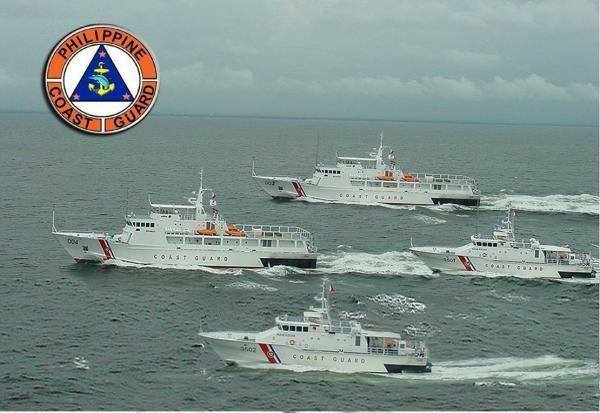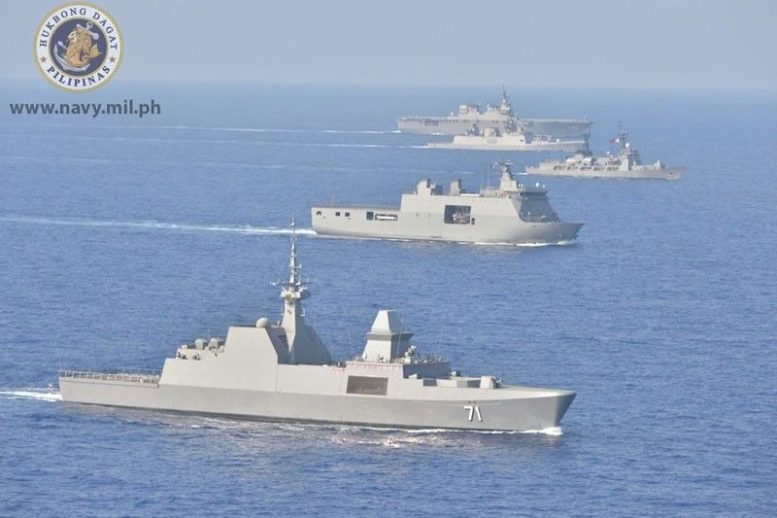Reviewing some of my past email, I came across a June 23, 2011 query from a Philippine Marine reserve officer, Frank Suha, who has been living in the United States for many years:
There is recent news that PCG is planning to buy brand-new high endurance cutters/vessels – this will be a big help in the West Philippine Sea issue. It has already ordered 6 German helicopters. In relation to this, how is the relationship between the PN and PCG today? Is there rivalry between the two to the point of undermining government objectives? Or is it a healthy friendly rivalry? Or there is no rivalry- just cooperation and camaraderie?
Does the 4 star rank of the PCG commander have any effect on PCG‘s relationship with PN‘s 3 star rank? Or it has no effect?
My reply was:
Of course not. All (AFP) service commanders will, sooner or later be O-10 (4-star general/flag officer) but that is not a priority for the moment, given our many problems.
Use of Coast Guards in contested areas has the advantage of being considered police action – not hostile to another country’s military force.
The Navy can show the flag in less contested areas not too far away.
Let us build a strong Navy (and Coast Guard). Not the ningas cogon variety, but in a determined way, using our shipbuilding capability.
Revisiting this, I realized that I did not really answer, or perhaps tended to avoid, the question of rivalry, which somehow came up. In my interview by Rappler Editor-at-large Marites Vitug on Monday, July 15, 2019, to discuss the government’s next actions on the Recto Bank incident and the overall situation in the West Philippine Sea, the question of rivalry versus cooperation came about many times reflecting the perception of many outside the military organizations.
My reply was, and will always be that there is really no rivalry and while in the minds of a few Navy officers, there is still a question on the rationale for separating the Coast Guard, in essence the Navy leadership and majority of the officer corps of the Navy have accepted the reality of the existence of the PCG as a separate and distinct maritime agency. The succession of Navy Chiefs from VADM Mariano J Dumancas on supported it, and it is, I believe fait accompli. Except perhaps for the very few who miss the Coast Guard as a part of the Navy organization, which expands the navy mission to include that of a non-combat organization intended not for war fighting but maritime security, safety and environmental protection.
Why can’t the Navy do both? The fact is it cannot, as its intrusion into another country’s territory or enforcement action against a rival country in international waters can be construed as aggression, whereas for the Coast Guard it is law enforcement in accordance with international law and an IMO mandate as the authority of the port state.
This issue on encroachment is why there was such an outcry from DFA Sec Teodoro Locsin, Defense Sec Sec Delfin Lorenzana, Supreme Court Senior Associate Justice Antonio Carpio, and, convinced to say something after years of trying to appease China, President Rodrigo Roa Duterte. who, however, again visited Beijing early September to avoid “escalating the moment” (His report to the nation was aired that Friday after his arrival: https://www.youtube.com/watch?v=cigI01LMt2k).
Views expressed by all sectors show some misunderstanding of the issue. Most harped on encroachment into Philippine territorial waters, in which innocent passage is firmly established under international law. But I submit that yes, while they can do that, it is a matter of “tit for tat” as China likewise requires other countries to seek permission to enter their territory.
What is not highlighted in many expert opinions, however, is that the PLA Navy intrusions included passage through INTERNAL waters (e.g., the Sibutu Strait case), in which clearly, the coastal state has absolute jurisdiction.
As an optimist, I still believe that we can resolve this via continuous dialogue with China, as I have expressed many times that practically the whole world supports the arbitral ruling, including Russia, the EU, Japan, divided ASEAN and the United States, but who for the moment mostly do lip service to avoid war.
Finally, on the Navy-Coast Guard Quandary, I have seen the near-realization of the answer in my mind since I wrote the article, “Philippine Coast Guard: Quo Vadis?” in the early ‘60s. It can be summed up in the rationale we all had in mind, including the PCG Family and that of our former President who made it happen.

From the recollections of former Coast Guard Commandant RAdm William Melad PCG as cited in https://news.mb.com.ph/2017/12/16/separation-of-the-pcg-from-the-navy/:
Enhancing our maritime sector
Rear Admiral Melad recalls that turnover event in April 1998 “clinched the deal” for the PCG. We would never look back again.
We owe it primarily to an understanding, progressive, maritime oriented and decisive Commander-in-Chief who put this project in his development agenda, and the statesmanship and professionalism of the PN Flag Officer-in-Command, Vice Admiral Dumancas.As the experience of the Bajo de Masinloc (Scarborough Shoal) standoff in 2012 showed, FVR’s decision to pursue the existence of a separate “white ship” agency proved to be well-conceived and timely in the light of the critical developments in the West Philippine Sea and current trends in maritime safety administration.
On the third week of November 2017, the PCG hosted and chaired the ASEAN chiefs of coast guards forum at Misibis, Albay. Clearly, the ASEAN and regional players have seen it necessary to establish a common link in accomplishing law enforcement, search-and-rescue, marine environmental protection as well as patrolling each country’s EEZ. The Coast Guard organization has become a common caring, sharing and daring institution among countries in East Asia.
Japan has renamed its Maritime Safety Agency (JMSA) as the Japan Coast Guard (JCG), the Vietnam Coast Guard (VCG) has metamorphosed similarly from a maritime police in 2006, and Indonesia has reorganized its Directorate General for Sea Communication (DGSC) and created its Indonesian sea and coast guard, albeit contending with “Turf War Issues.” Malaysia’s Maritime Enforcement Agency (MMEA) is being slowly transformed to Malaysian coast guard. The PCG, looked upon as one of the more mature coast guards that had carried that name as a government bureau since 1901, has been cited as a good example among Asian Countries.
Coast guard organizations around the world
These coast guard organizations belong to various groupings in addition to the ASEAN chiefs of coast guards forum. They bond together during meetings of the International Maritime Organization (IMO) in London, as well as during regional sectors organized under the many maritime conventions of IMO – regional meetings and exercises under the Search and Rescue (MSAR) convention, port state control, prevention of Marine Pollution (MARPOL), and the 20-nation regional cooperation agreement on combating piracy and armed robbery against ships in Asia (RECAAP).
“It is certain the Coast Guard organization is here to stay. The PCG will forever be grateful to FVR,” concludes Rear Admiral Melad.
